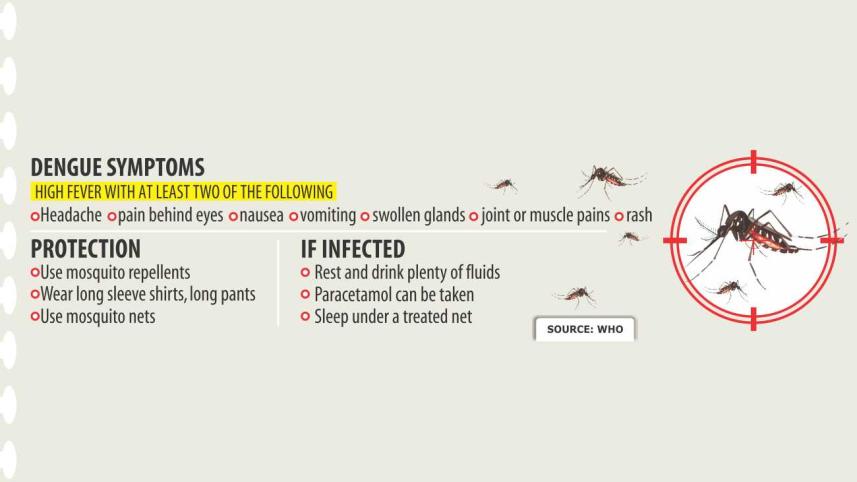Dengue strikes early

The capital has seen an early outbreak of dengue as compared to previous years and the situation could take a turn for the worse in the months to come.
A large number of dengue cases are reported in Bangladesh in June and the number drops in November.
This year, however, a lot of city people had been infected with dengue by April.
Till July 17, the total number of dengue patients in the capital was 471, shows data from the Institute of Epidemiology, Disease Control and Research (IEDCR).
Of the dengue cases, nine were reported in January, two in February, 13 in March, 41 in April, 76 in May, 183 in June and 147 in this first 17 days of this month. At least three of the patients have died.
The number of such infection was quite low in Dhaka from January to May in 2007-2015. However, it started to rise in June and reached its peak in September, according to statistics.
In the previous years, the reported number of dengue patients was below five in April, below 10 in May and below 60 in June.
The dengue issue is critical as the country had reported having 2,551 cases of the disease last year. The number was highest in a single year since 2005.
Five people infected with dengue died last year.
The same year, India had nearly one lakh dengue cases in which around 220 people died.
In Bangladesh, most of the dengue cases are reported in June as intermittent rains and high temperature and humidity during the month create the ideal breeding conditions for Aedes mosquitoes that transmit the dengue virus to human bodies, say health officials.
Prof Saif Ullah Munshi of virology department at Bangabandhu Sheikh Mujib Medical University said this year's “dengue scenario” could turn “worse” following the early outbreak.
Aedes mosquitoes have bred early this year which would increase their population. So there are chances that they would bite people more, he told The Daily Star.
He also claimed to have found in his study on dengue that around 70 percent of the dengue patients in last year were attacked by DEN-1 serotype of the virus. It was only 10-15 percent in the previous two years.
The World Health Organisation (WHO) says dengue outbreaks can occur any time if mosquitoes are active and there are four serotypes of the virus -- DEN-1, DEN-2, DEN-3 and DEN-4.
The serotype DEN-1 is comparatively new in Bangladesh, a country whose people had developed immunity to the previously-dominant DEN-2 serotype, Munshi said.
It seemed that more and more people are being infected with DEN-1 virus every year and that is why the number of dengue patients could rise this time around, he added.
To fight Aedes mosquitoes, he suggested that the authorities concerned should immediately launch a widespread campaign to encourage cleanliness in households and their surroundings and proper disposal of waste, empty bottles and other containers.
Dr AKM Shamsuzzaman, director (communicable disease) at the Directorate General of Health Services (DGHS), said rain, humidity and high temperature since April created the perfect condition for
Aedes mosquitoes to breed.
However, he said there was nothing much to worry as the DGHS had “already started working on creating awareness through the media and doctors.
“With the help of the WHO, we have sent diagnostic kits to the public hospitals in districts. Such kits at district levels had not been provided earlier,” he told this newspaper over the phone.
Chief health officers of two city corporations in Dhaka said their mosquito control programmes were going on as usual.
“Soon, we will hold rallies at particular zones and run campaigns through the media to create awareness on dengue,” Brig Gen SNN Saleh Bhuiyan, chief health officer of Dhaka North City Corporation, told this correspondent last week.
The DNCC recently started distributing posters and leaflets among people to create awareness on dengue prevention, he added.
Brig Gen Saidur Rahman, chief health officer of the Dhaka South City Corporation, claimed to have received reports of only five dengue cases in the DSCC area this year.
Aedes mosquitoes breeds on clean water, mostly within and close vicinity of households which are out of the purview of the city corporation cleaners or mosquito controllers, he pointed out.
Therefore, the DSCC has written to the Real Estate and Housing Association of Bangladesh (REHAB) to help create awareness among landlords on the issue. Besides, the corporation would hold a meeting with the REHAB in a week, Rahman mentioned.
DENGUE VACCINE
In April, the WHO Strategic Advisory Group of Experts on Immunisation recommended that countries with dengue cases consider introduction of the vaccine, Dengvaxia, developed by pharmaceutical company Sanofi Pasteur, only in geographic settings with high endemicity.
The vaccine was first registered in Mexico in December last year and then in the Philippines.
It is a live recombinant tetravalent dengue vaccine that has been evaluated as a 3-dose series and registered for use in individuals 9-45 years of age living in endemic areas, WHO said.
Prof Munshi said Bangladesh was still not a high endemic country for dengue, and so the vaccine was not required.




 For all latest news, follow The Daily Star's Google News channel.
For all latest news, follow The Daily Star's Google News channel.
Comments